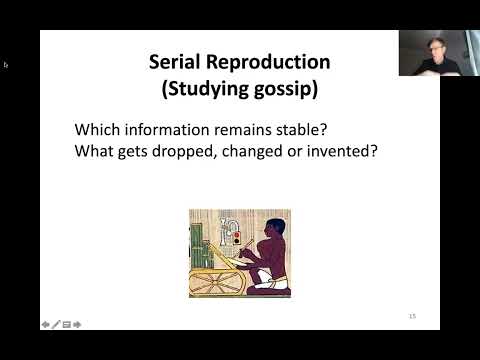 Speaker: Fritz Breithaupt
Speaker: Fritz Breithaupt
 Affiliation: Indiana University
Affiliation: Indiana University
Title: The Emotional Rewards of Narratives
Abstract (long version below): We recently conducted the largest multiple-iteration retelling study to date with 12,840 participants and 19,086 retellings (serial reproduction of narratives). In the study, we found that emotional appraisals are transmitted across retellings with astonishing accuracy, while other elements of the story, including coherence and rationalization deteriorate. It appears that the causal connections in the plot do not tend to provide stability across retellings, while nevertheless emotional appraisals are preserved. Based on these findings, we hypothesize that narratives provide an emotional reward for storytellers and recipients. The talk will include the data analysis and a proposal for the Emotional Reward of Narrative model (ERN).

 Long abstract
Long abstract
We recently conducted the largest multiple-iteration retelling study to date with 12,840 participants and 19,086 retellings (serial reproduction of narratives). In the study, we found that emotional appraisals are transmitted across retellings with astonishing accuracy, while other elements of the story, including coherence and rationalization deteriorate. Appraisals of happiness, sadness, and also embarrassment showed high appraisal preservation, as did surprise. Our data suggest that retellers, upon reading stories, appraised stories according to the relevant emotion, and reconstructed elements that reproduced their appraisal in the retellings. Remarkably, the original emotional appraisal can be preserved even as the original plot is changed in retelling. The talk will present some pretty dramatic changes of storylines in several generations of retelling, that nevertheless preserve the degree of emotion quite accurately. It appears that the causal connections in the plot do not tend to provide stability across retellings, while nevertheless emotional appraisals are preserved.
To describe how people retell stories, we suggest that people encoded happy and sad stories by encapsulating the events and details into an overall emotional appraisal of the story and that this processing strategy might also apply to stories involving other emotions like embarrassment and surprise. The emotional appraisal played a key role in retelling by helping to guide the selection, invention, and ordering of the story elements. Hence, we posit that emotion appraisals can operate as anchors for remembering and retelling stories, thus playing an important role in narrative communication. We refer to this affect and emotion focus in retelling as affect-bounded retelling.
Our findings go partly counter to the findings by Bartlett (1932). In general, emotions in narratives are not well understood, as noted by Nabi and Green (2015), and emotions are not usually considered a central part of situational models of narratives or events (Mandler & Johnson, 1977; Trabasso & Stein, 1997; Zwaan, Langston, & Graesser, 1995; Zacks, 2020). We wish to address the understudied role of emotion in narrative cognition.
In this paper for IGEL, a novel hypothesis will be presented that aims to account for the results of these and related studies, including an ongoing study. The hypothesis is that emotions operate as rewards for engaging in narratives. We refer to this model as the Emotional Reward of Narratives Model (ERN). We suggest that there is a link between narrative episodes and specific narrative emotions that reward people for engaging in these narratives.
There is a wide range of such narrative emotions, and the talk will address several of them. One of them is (moral) satisfaction as an emotional reward when characters receive their comeuppance (Flesch, 2007); astonishment can operate as reward for engagement in narratives that are driven by riddles and mystery; and the core emotion of being-moved plays a significant role in aesthetic appreciation (Menninghaus et al., 2015).


 I was surprised how disgust was the odd one out. I would expect it be to be an emotion that really sticks… (personal experience… of stories that are alas not easy to forget) but maybe it is one that is less suitable for your method of retelling? It is maybe not something that people like to retell? How do you explain this?
I was surprised how disgust was the odd one out. I would expect it be to be an emotion that really sticks… (personal experience… of stories that are alas not easy to forget) but maybe it is one that is less suitable for your method of retelling? It is maybe not something that people like to retell? How do you explain this?